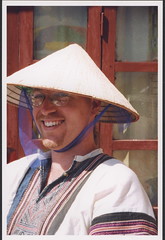When Broken Glass Floats: Growing Up Under the Khmer Rouge
Chanrithy Him
A memoir from Cambodia, this story is well written and, as you would expect in a story of genocide, sometimes painful to read. The author grew up in a relatively well-educated family in Phnom Penh, whose life was turned upside-down when the Khmer Rouge came to power in 1975. The book is full of dignity and humanity, standing witness to the appalling lack of either from those in power at that time.
Snow on the Moon
Keith Heller
I picked up this book quite randomly at a used bookstore - there is one bookstore in Hanoi with used English books which I found long long ago J . A novel loosely set in a small town in Spain late in World War II, it is written in a style which reminded me of so many English literature ‘classics’ that I’ve read. The impression was strengthened, I think, by the actual book – a high quality paperback that is dog-eared from use and brown from humidity. The story is snowy and mysterious, the strength of a child’s prescient naiveté playing against an adult’s hesitant willingness to be involved.
Catch 22
Joseph Heller
I guess this is one of those classics that I never got to until recently. I thoroughly enjoyed it, and spent a great deal of time laughing while I was reading this book. The story is of a bomber pilot at the end of World War II. The story, however, is in the telling of it. The satire is sharp and irresistible, it’s just been too long since I read something which made me laugh and think at the same time!
The God of Small Things
Arundhati Roy
A beautifully woven story of complex characters, Arundhati Roy’s first novel is transfixing in detail and inexorable in tragedy. It is a novel truly deserving all the praise heaped on it. I’m not sure how it happened that I didn’t read it sooner.
Rebiya Kadeer
The endless expanse of the Gobi Desert, paradoxically ancient yet fragile and crumbling remains of Silk Road cities, Kashgar’s incredible carpet bazaar, the cool underground streams of Turpan on a sunny afternoon, a blood-stirring drum and fife sidewalk performance by local boys in Urumqi, the friendly welcoming smiles of new acquaintances, long hours on uncharacteristically (for China) empty trains; these are my memories of Xinjiang, western China. Rebiya Kadeer’s memoir recounts her experiences growing up and her life as a mother, entrepreneur, big business owner, government representative and, eventually, prisoner, in Xinjiang, and finally as a Uyghur activist from the other side of the world. It is an inspiring story of fortitude.
Chris Alden
A technical and analytical look at the rapidly growing influence of China in Africa, economic and otherwise, this book is short and full of data. I appreciate the academic approach to this topic; it seems that most of what I come across to read on this theme, from my Western-centric media consumption habit, is in passing, shallow and frequently inflammatory. Alden presents a well-supported overview of China’s impacts on Africa, as well as exploring the various motivations for this natural expansion of influence and the potential ramifications both for Africans and Chinese.
Wolf Totem
Jiang Rong
This is a truly fascinating novel set in China’s grasslands of Inner Mongolia during the Cultural Revolution. A Chinese student travels to the grasslands to live among the Mongol herdsmen to learn about them and, as usually happens in such cases, to learn about himself. It was written and published in Chinese before being translated, and features a great many philosophical discourses ranging from the respective characteristics of nomadic vs. agricultural societies, the Han Chinese relationship to ethnic minority groups, the impact of development and migration on nature, to, perhaps in the most grandiose interpretation, a general critique of the ‘Chinese character’. It is a very compelling read. While sometimes veering into an overly idealistic view of nomadic life or presenting a simplistically monolithic view of the above-mentioned ‘Chinese character’ (from an outsiders perspective, the diversity of China seems more prominent to me), the fable-like tone of the writing makes it a good read regardless of one’s interpretation.

No comments:
Post a Comment